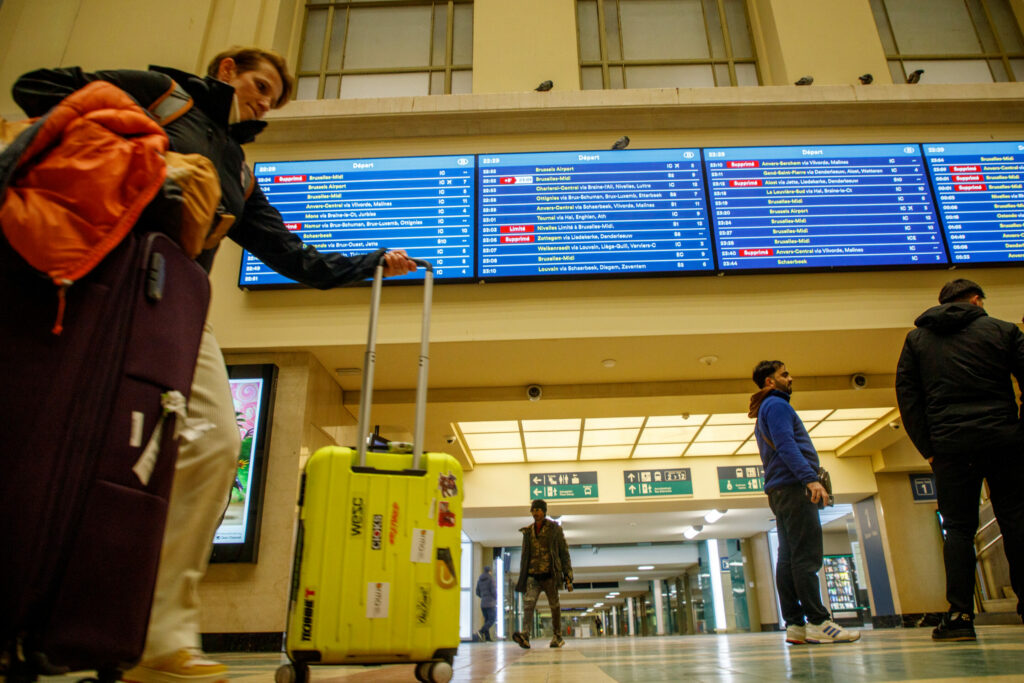A nationwide strike is being organised on Monday 13 January. Workers from all sectors are taking part. Public transport in Brussels and Wallonia, trains across the country, flights, postal services, and schools will be impacted. Military and prison staff are also striking, as well as rubbish collectors. Read the latest updates here.
This article is a summary of the developments of the national strike on Monday 13 January. It is no longer being updated.
[17:13] - Traffic piling up
The traffic jam barometer of the Flemish Traffic Centre (Vlaams Verkeerscentrum) has indicated that there is currently a total of 208.02 km of traffic jams on the main roads in Flanders. "This is exceptional," the centre noted. On the outer ring road around Brussels, drivers are facing a wait of up to an hour. On the small ring road in Brussels' centre, they lose up to half an hour.
Train traffic remains disrupted. One in three IC trains and one in five local trains (S and L) are running.
[15:49] - Longer evening rush hour
The disruption of public transport led to a busier morning rush hour and more traffic jams than usual. What should drivers in Brussels expect this afternoon and evening?
"We expect a different type of busyness in the evening rush hour," Brussels Mobility's spokesperson Inge Paemen told The Brussels Times. This morning, the rush hour saw many people arriving in a short space of time, causing severe traffic jams. "This evening, we are more likely to expect people to leave Brussels dispersed, so we think there will be a longer evening rush hour, rather than a short, very busy rush hour."
[14:58] - Brussels fire brigade reacts to violence
The Brussels Fire Brigade regrets the confrontation between the police and some firefighters during the demonstration and deplores all forms of violence against the police. "This behaviour does not reflect our values. We can make our demands calmly and with dignity," spokesperson Walter Derieuw said.
"The police can count on our unwavering and unconditional support as a privileged partner." However, it is not yet confirmed that the firefighters involved were part of the Brussels fire brigade. "An investigation will have to establish the circumstances and identity of the troublemakers and they will suffer the consequences," Derieuw concluded.
[14:48] - 'Historic' number of Flemish teachers on strike
A total of 34,314 Flemish teachers went on strike, figures from the Flemish Agency for Educational Services showed. Some 25,000 of them also took part in the protest action in Brussels. Out of a total of 211,317 teachers, the strike rate is 16.24%. According to the Christian Education Centre, this is a historically high number.
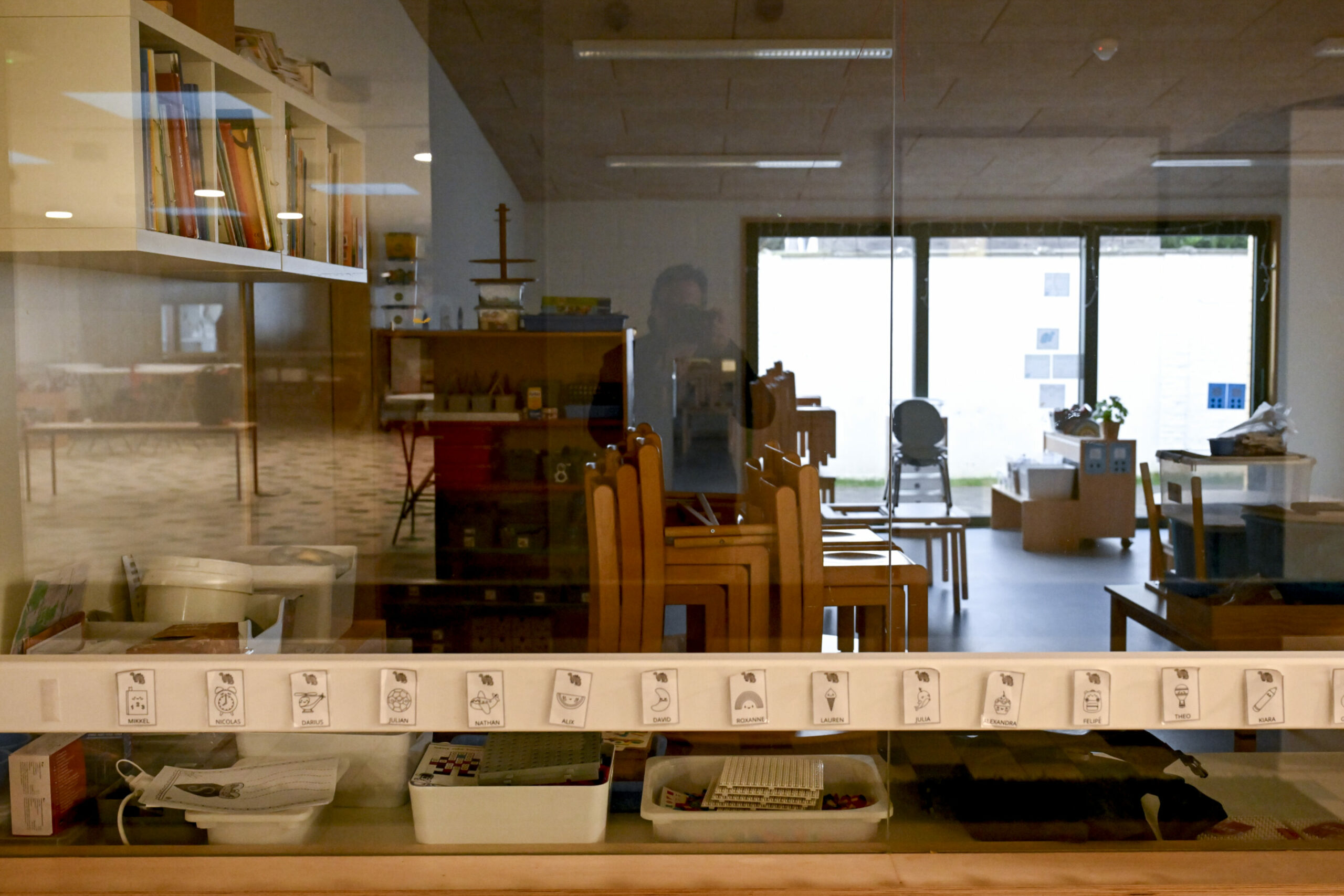
An empty classroom due to a strike of the teachers on Monday 13 January 2025. Credit: Belga/ Dirk Waem
[14:33] - 90% of mail delivery rounds were completed
Postal delivery was not significantly impacted by today's strikes, a Bpost spokesperson confirmed. Almost 90% of routes were completed across the country, with Wallonia experiencing most of the disruptions.
Overall, out of 656 post offices, only 14 were closed. Most of these are located in Brussels.
[13:43] - 70% of Brussels bin bags collected
Bruxelles-Propreté (the Brussels agency responsible for public cleaning) has confirmed that union actions had little effect on rubbish bag collection rounds. Some 70% of the rubbish bags were collected.
Earlier in the day, it noted that 30% of the rubbish trucks could not leave the depot in the morning, causing delays. The municipality of Ixelles was particularly affected, as were Anderlecht and certain parts of the city of Brussels (Bockstael, the Canal and Louise). Here, 30 to 70% of rubbish was left lying around.
More disruption is expected in the afternoon. The collection of the residual waste (white bags) in Anderlecht, Berchem-Sainte-Agather, Ganshoren, Molenbeek-Saint-Jean and Jette will be delayed. However, the bulk will still be collected on Monday during catch-up rounds.
[13:35] - Union top man does not rule out general strike
At the end of the demonstration, the president of the socialist trade union federation ABVV-FGTB Thierry Bodson said that the union's federal committee will meet as soon as there is a coalition agreement. "If it turns out that nothing has changed from what is circulating now, our federal committee can declare a general strike."
The unions are already planning another big demonstration for 13 February, which will focus on public services. "By then we will have sight of the unacceptable policies the new government has in store for workers."
The other union leaders did not go as far as Bodson. Christian trade union ACV's Ann Vermorgen did call the demonstration a "very big warning to the negotiators", adding that "they cannot ignore us anymore".
[13:25] - Impact on students
The strike is taking place in the middle of the Belgian exam period for universities and colleges. Because of the predicted impact on public transport and traffic generally, the French-speaking students' federation (FEF) called for a postponement of Monday's exams.
Johal, a secondary school student at the Athénée Robert Catteau next to Place Poelaert, has a sister studying at ULB. "I support the right to strike but I don't know if the timing is ideal, because a lot of students are affected by the transport strike," he told The Brussels Times. "My sister has exams today. It’s complicated for her classmates who are travelling to Brussels from elsewhere."
[12:45] - Firefighters attack police officer
A small group of firefighters deviated from the planned route and tried to block traffic on the Small Ring Road, near Porte de Namur. This briefly led to a confrontation with the police.
"During this demonstration, several colleagues were injured following an incident that took place around noon," police reported in a press release. "Several firefighters attacked our colleagues. Gas was briefly used in the process."
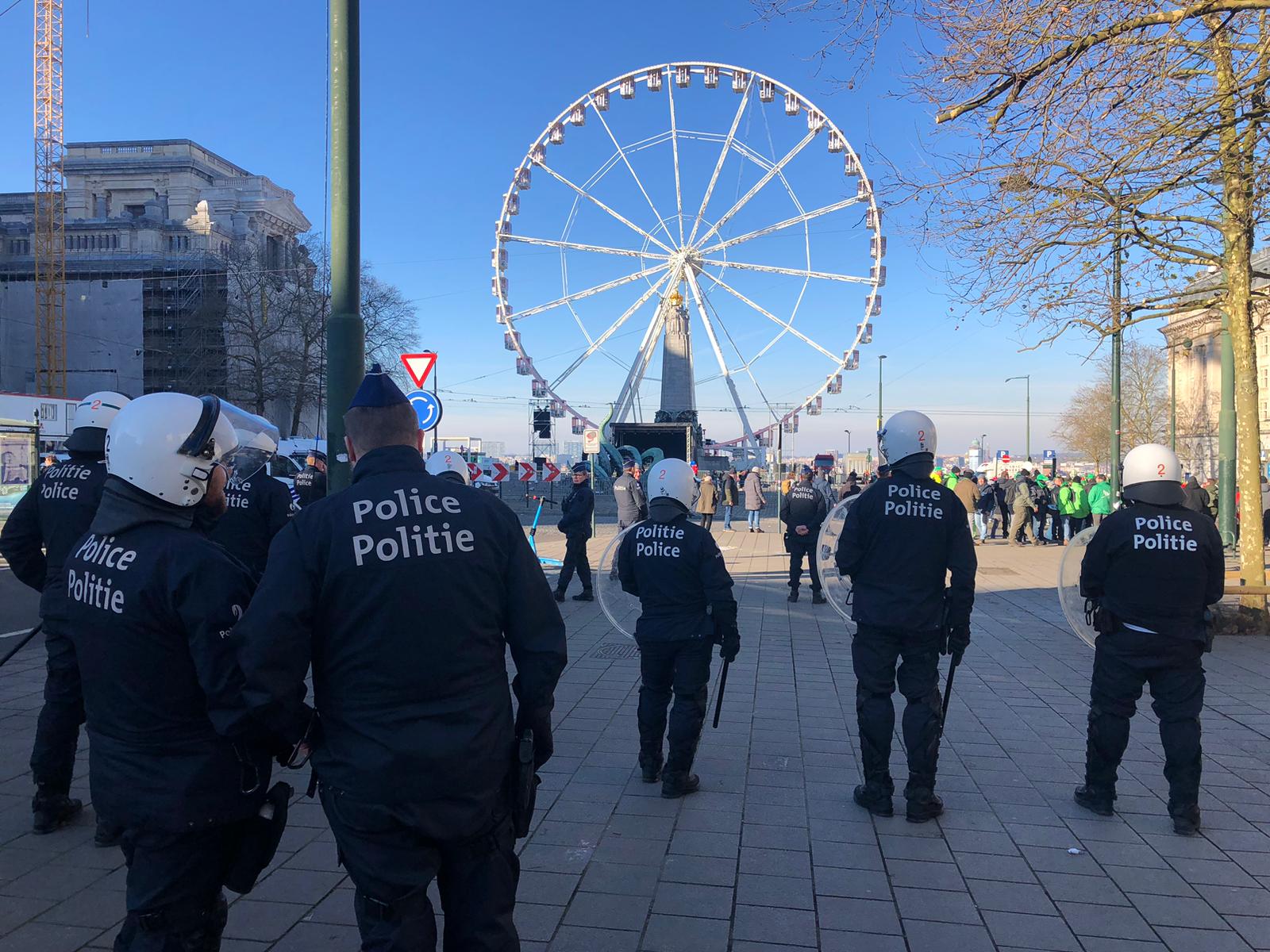
Police closing in on Place Poelaert, where the demonstration ended on Monday 13 January. Credit: The Brussels Times
Police said they will thoroughly investigate the incident and "take the necessary measures to prevent it from happening again in the future".
[12:31] - Over 30,000 protestors
More than 30,000 demonstrators took to the streets of Brussels on Monday morning, president of the socialist trade union federation ABVV-FGTB Thierry Bodson said. This figure was confirmed by the City of Brussels/Ixelles police zone.
Activists were still at the starting point near Brussels Central railway station over an hour after the march started at 10:30. Around 100 firefighters from Liège, Brussels and Flanders led the march, followed by the main French- and Dutch-speaking union representatives. Flemish teachers made up the largest share of demonstrators.
[12:21] - Primary education most impacted
The three Flemish education umbrella organisations have confirmed the impact of the strike is greatest in primary education. In a lot of primary schools, classes were cancelled or distance learning was put in place. In some schools, staff turnout was so low that schools stayed shut, as they couldn't organise childcare.
In secondary schools, many classes continued as usual, while several schools switched to distance learning. GO! education (community education) head Koen Pelleriaux said the strike is bigger than previous actions. Catholic Education Flanders agreed.
[12:08] - Drivers told to avoid Small Ring Road (R20)
The City of Brussels/Ixelles police zone has asked motorists to completely avoid the Small Ring Road (R20) in Brussels. Traffic disruption is expected to last until 12:30, however, as the start of the demonstration was delayed, this could last slightly longer.
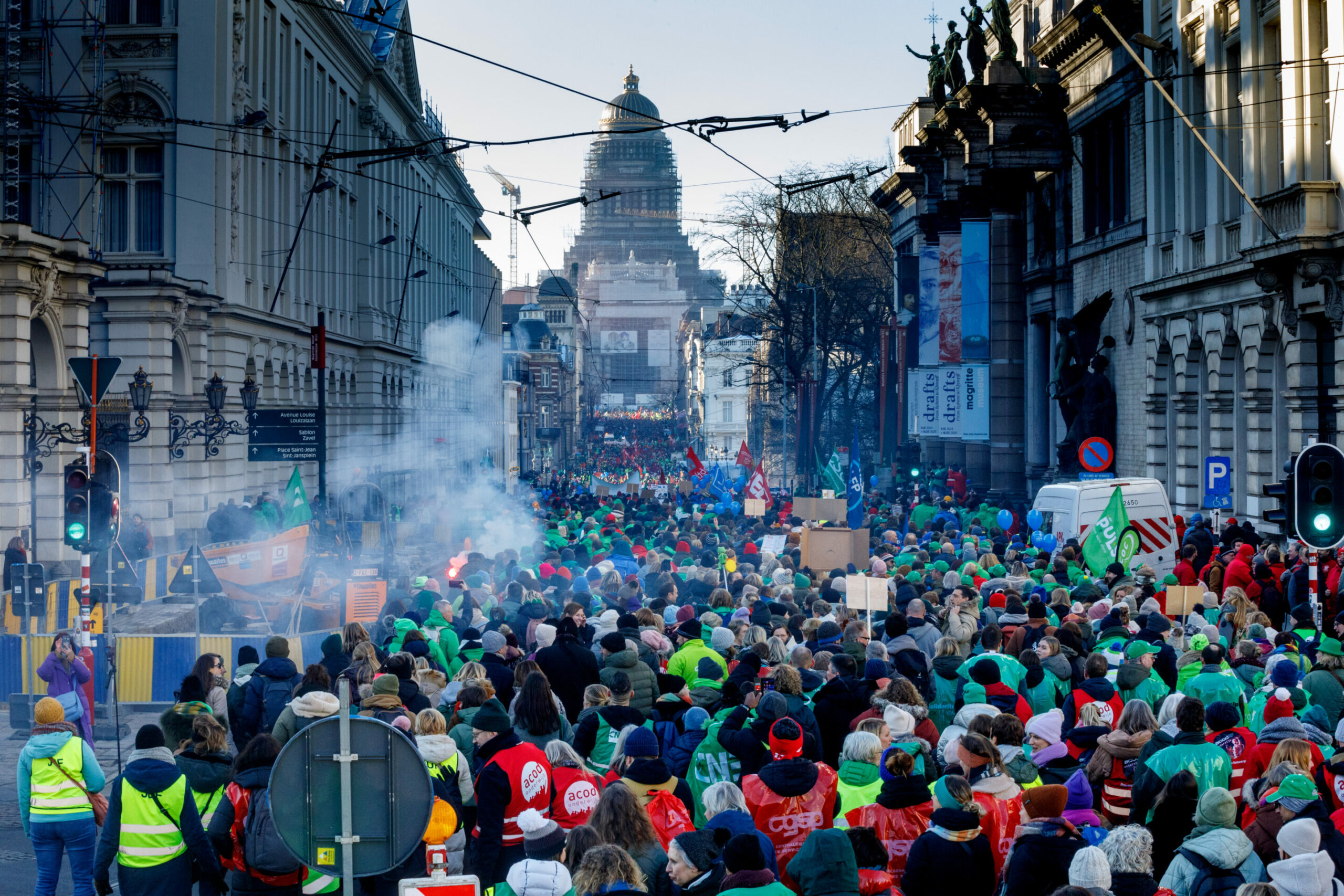
Demonstrators walking on the Small Ring Road during a national demonstration on Monday 13 January 2025. Credit: Belga / Hatim Kaghat
[12:01] - Police assisting in some prisons
Prison staff, a sector that is repeatedly on strike, are also taking part. Their strike will last until 06:00 on Tuesday. In some facilities, police assistance is needed due to the lack of guards present. In Saint-Gilles prison, the Red Cross is offering support.
[11:58] - Louise roundabout closed
The Louise roundabout in Brussels, located near Place Poelaert, has been closed to traffic, the City of Brussels/Ixelles police zone confirmed. "Please avoid the area by car," it noted on social media.
[11:53] - Vooruit MPs march against their party's plans
A delegation from the Dutch-speaking socialist party Vooruit was spotted among the demonstrators, VRT NWS reported. The party has a seat at the negotiating table as part of the government formation talks. MP Oskar Seuntjens said he understands that people are worried.
He noted that the Vooruit MPs weren't protesting per se, but wanted to show respect and to listen to people's concerns. "There is no agreement yet. We will continue to do our utmost to make the agreement as social and fair as possible."
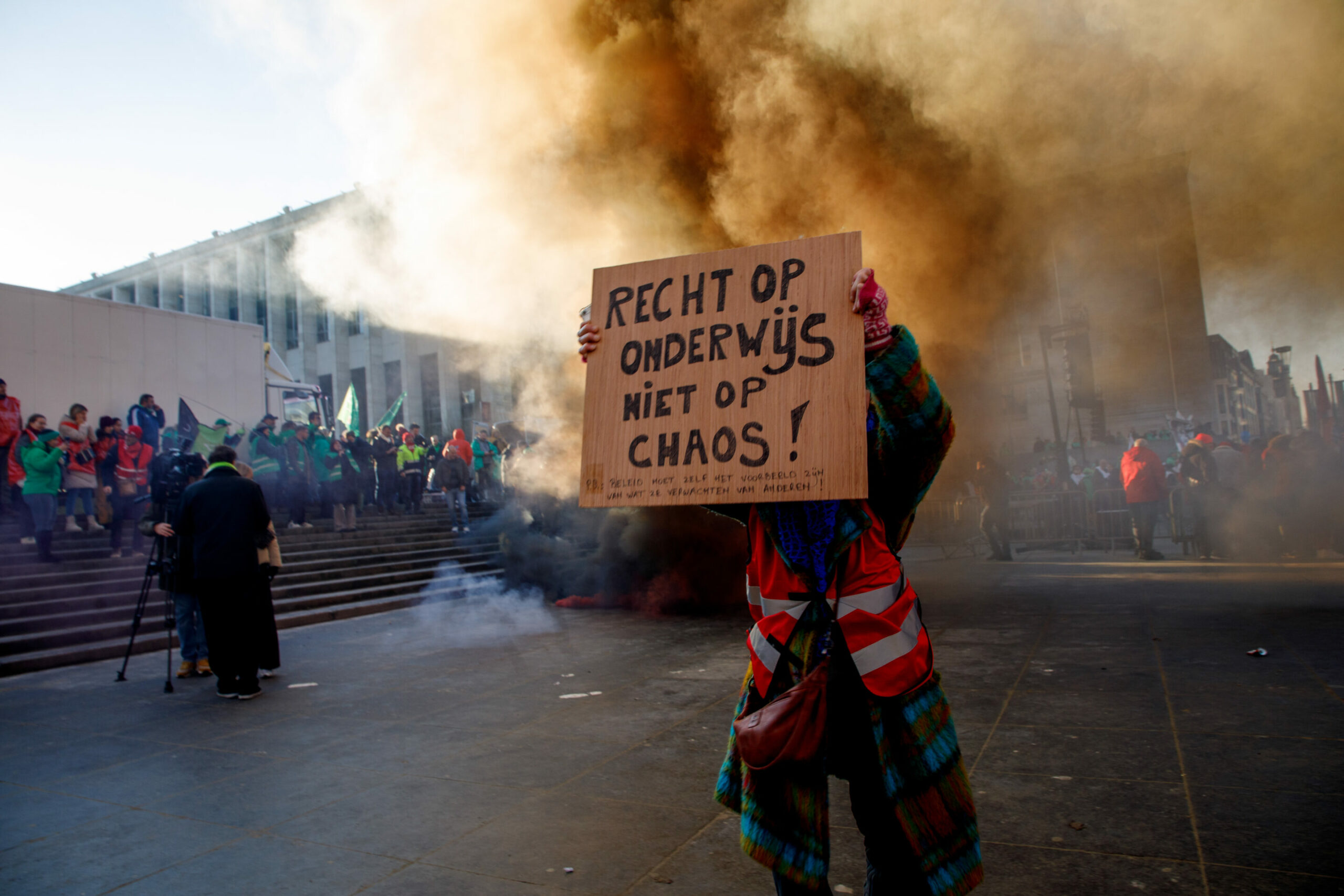
A participant holds a sign reading 'right to education, not to chaos'. Credit: Belga / Hatim Kaghat
Leaders of the future opposition parties are also present, including Paul Magnette (chair of PS) and Bart Dhondt (chair of Groen).
[11:39] - First participants arriving at Place Poelaert
The first people have started arriving at Place Poelaert, where the demonstration will end. The demonstration, which started around 30 minutes later than expected, is proceeding very slowly due to the large number of people marching along. No incidents have been reported so far.
[11:15] - 'Premature, irresponsible and frivolous' actions, Voka says
The Flemish employers' organisation Voka has called Monday's strike "premature, irresponsible and frivolous" in a press statement. It argued that the strike affects tens of thousands of people, but also businesses, adding that this damages the entire economy.
"The unions are very quick to reach for the strike weapon," said Hans Maertens, managing director of Voka. "They are protesting intentions and plans, not final measures when talking about pension reforms. Strikes should be the ultimate means of pressure, not a means of action that is taken lightly."
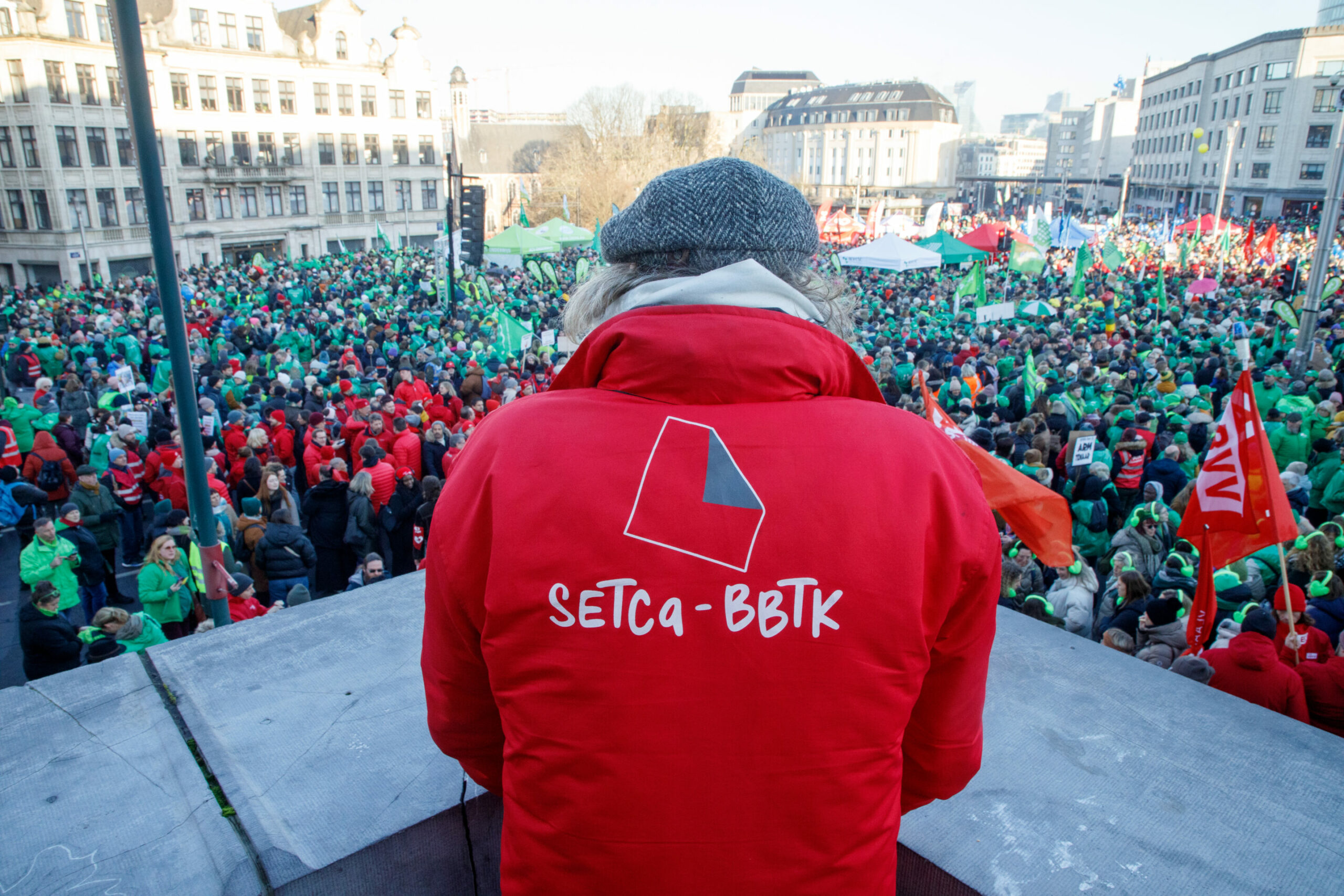
A Setca-BBTK union member at the start of the national demonstration on 13 January 2025. Credit: Belga/ Hatim Kaghat
He stressed that the Belgian economy and especially its industry are in dire straits because of declining demand, soaring labour costs and energy prices, and administrative burdens. "By striking every 13th day of the month, they are further complicating and aggravating the situation for our companies."
[10:55] - More street closures
The City of Brussels/Ixelles police zone confirmed that the Boulevard Roi Albert II coming from R20 (near Gare du Nord station) is closed to traffic. The road is on the other side of the region from the demonstration route. A spokesperson told The Brussels Times that it was shut off as the buses with which people arrived, are being parked here.
On the route, countless participants are walking to the sound of firecrackers and whistles, and calling out slogans. The procession is so crowded, it seems to have no end in sight, Belga News Agency reported.
[10:44] - 40% of Flemish state schools closed
Over 25,000 Flemish teachers are taking part in the strike. They account for 90% of the total turnout. As a result, classes are cancelled in around 40% of municipal and city primary and secondary schools in Flanders, a survey of 118 schools by the Education Association of Cities and Municipalities (OVSG) showed.
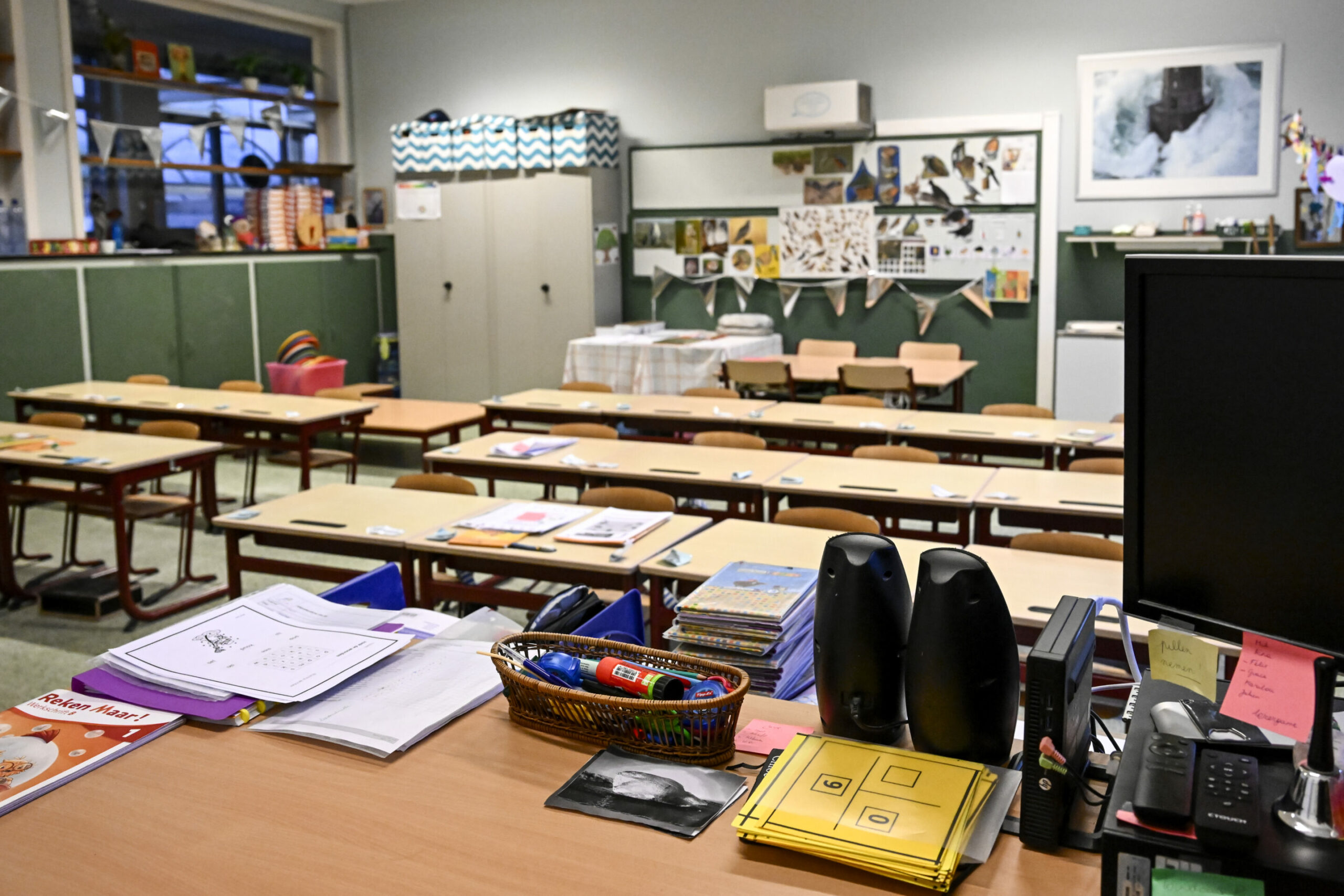
An empty classroom on Monday 13 January. Credit: Belga/ Dirk Waem
In just over 30% of the schools, classes will not continue, but emergency shelter is provided. In another 8.5% of OVSG schools, the school gates remain completely closed. Meanwhile, 37% of schools are not impacted. In another 23% of schools, some teachers are on strike but classes can still go on.
[10:30] - Demonstration starts at Brussels Central Station
The demonstration was expected to leave Place Albertine, near Brussels Central Station, at 10:00. However, this has been slightly delayed, with participants expected to leave the meeting spot at 10:30.
Protesters are walking via Mont des Arts, Coudenbergh and Place Royale to Rue de la Régence before stopping at Place Poelaert, where several more speeches are scheduled.
(NL 👇)
Lundi 13 janvier 2025, une #manifestation aura lieu à #Bruxelles. Des embarras de circulation sont à prévoir de 9h30 à 12h30. Veuillez éviter les secteurs suivants : ➡️ Parcours : place de l’Albertine - Mont des Arts - Coudenbergh - place Royale - rue de la Régence -… pic.twitter.com/UP923efCPn — PolBru (@zpz_polbru) January 10, 2025
"Traffic congestion is expected from 09:30 to 12:30," the City of Brussels/Ixelles police zone noted. The whole route is closed off to traffic, as are the Boulevard de l'Empereur, Cantersteen and rue des Colonies. Drivers have been advised to avoid this area.
[09:50] - All Charleroi flights cancelled from noon
Charleroi Airport confirmed that all flights departing from the airport will be cancelled from noon onwards. "Charleroi airport is facing a major unforeseen shortage of staff from the external security provider," it noted on its website. "Security can no longer be guaranteed."
Departing flights will be cancelled until the end of the day. Arrivals are scheduled as normal. Passengers who had a flight departing from Charleroi are invited to contact their airline.
[09:37] - Rubbish collection in Brussels
As predicted, Bruxelles-Propreté (the Brussels agency responsible for public cleaning) has also been impacted by the strike. "30% of our trucks did not drive out this morning," the agency wrote on its website. Rubbish collection was expected in the City of Brussels, Saint-Gilles and Anderlecht, among others.
Residents and businesses are advised to leave their bags outside, anyway. "Catch-up collections will be organised."
[09:15] - Why are people striking?
Trade unions of the transport sector, education sector, national prison service, defence sector and the postal services Bpost have invited their members to participate in a national strike to protest the next government's probable reforms.
Unions argued that the measures on the table represent "unprecedented attacks on all working men and women". They warned these could include wage freezes, indexation reform, longer working hours, more precarious contracts, austerity, cuts to public services and prospects of lower pensions.
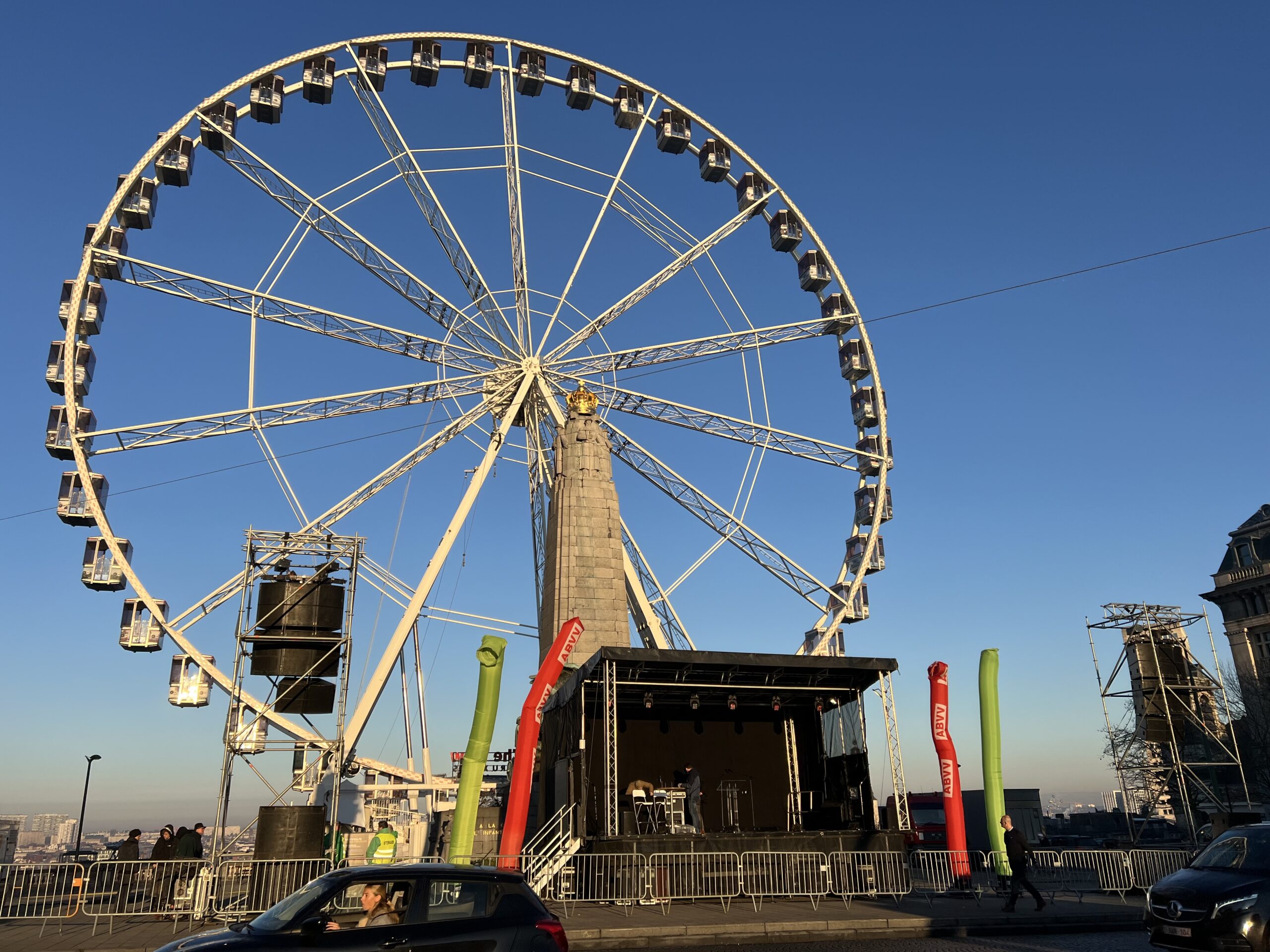
A stage on Place Poelaert, where the unions will congregate later. Several more speeches are planned here. Credit: The Brussels Times
Thousands of union members are expected in Brussels on Monday, for a demonstration against these plans. It will start at Place Albertine, near Brussels Central Station, at 10:00.
The common union front in education said at least 22,500 people from the Flemish education sector alone will make their voices heard in Brussels. The union VSOA-Defense will represent the Belgian military; an exceptional initiative, as military personnel have no right to strike.
[09:04] - Heavy traffic on Flemish motorways and in Brussels
It was particularly busy on the Flemish motorways on Monday morning, the Flemish Traffic Centre confirmed. By 07:00, the centre already recorded 80 kilometres of traffic jams. By 08:15, this figure had risen to 265 kilometres.
Brussels too, has seen a very busy rush hour. Especially on the Small Ring Road, traffic jams were long. Accidents have not yet been reported, but several tunnels were temporarily closed because of too much traffic.
[08:55] - Around 40% of flights cancelled at Brussels Airport
Many staff are on strike at Brussels Airport in Zaventem, Belgium's biggest airport. "Given the expected high impact, a significant number of flights have been cancelled or rescheduled. Passengers of affected flights will be informed by their airline or (online) travel agency," the airport noted on its website.
At least four in ten flights were cancelled on Monday, a spokesperson confirmed to Belga News Agency. Other flights will go ahead as planned, although minor delays cannot be ruled out.
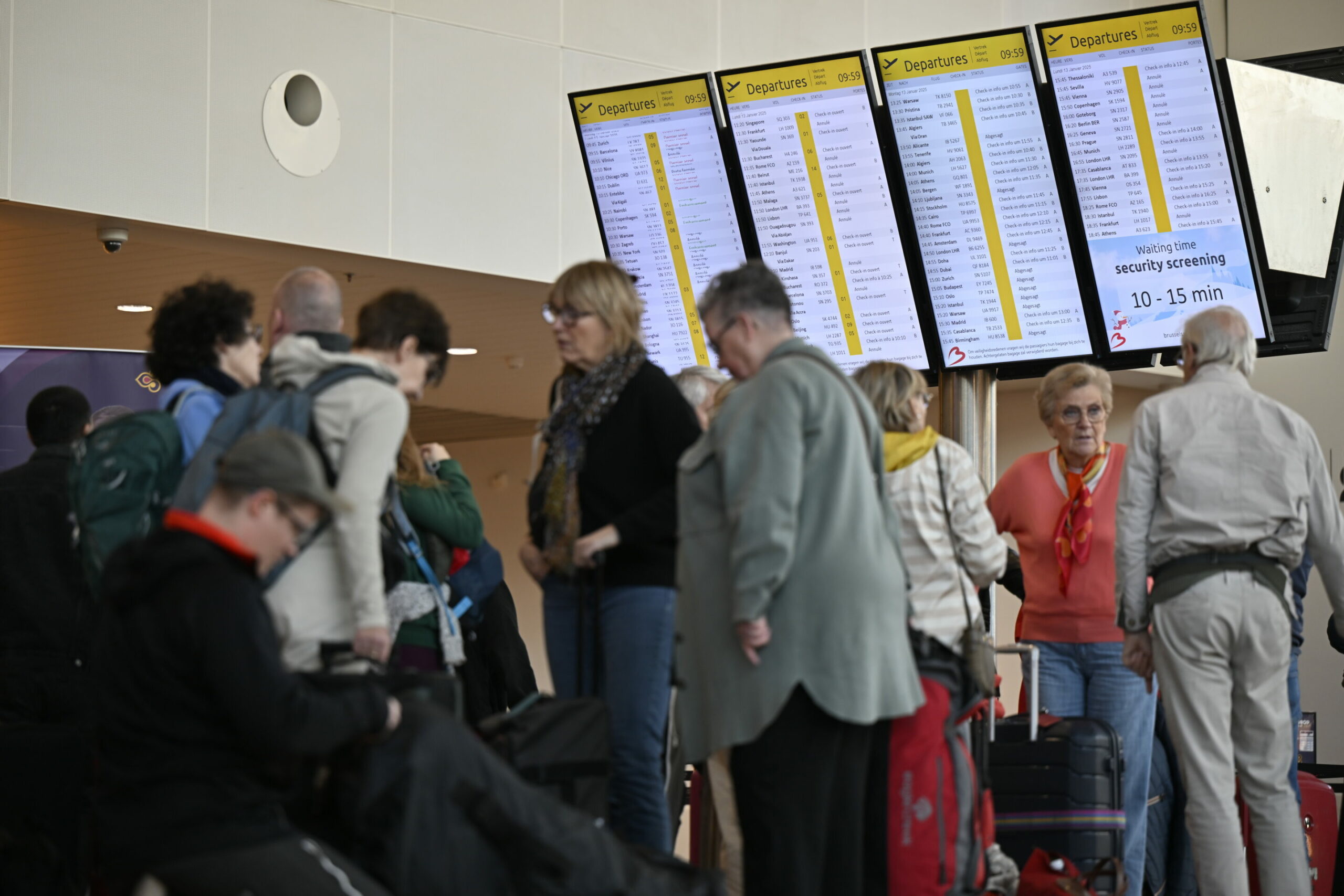
Passengers at Brussels Airport, in Zaventem during the strike on Monday 13 January 2025. Credit: Belga/ Eric Lalmand
Brussels Airport is asking passengers to leave for the airport on time, as public transport disruption could also hinder travel to the airport. They should also check their flight status.
[08:27] - Several trains cancelled
Trains across Belgium are also impacted by the strike. National railway operator SNCB confirmed that its alternative timetable, based on available staff, has been implemented as planned. "Depending on this, disruption may be greater in some provinces than others."
The situation at 08:30 is as follows:
- One in three IC trains will run (trains running between major cities);
- One in five S (suburban) and L (local) trains run;
- Most P rush hour trains will not run.
For updated information, check the journey planner on the SNCB website or via the SNCB app.
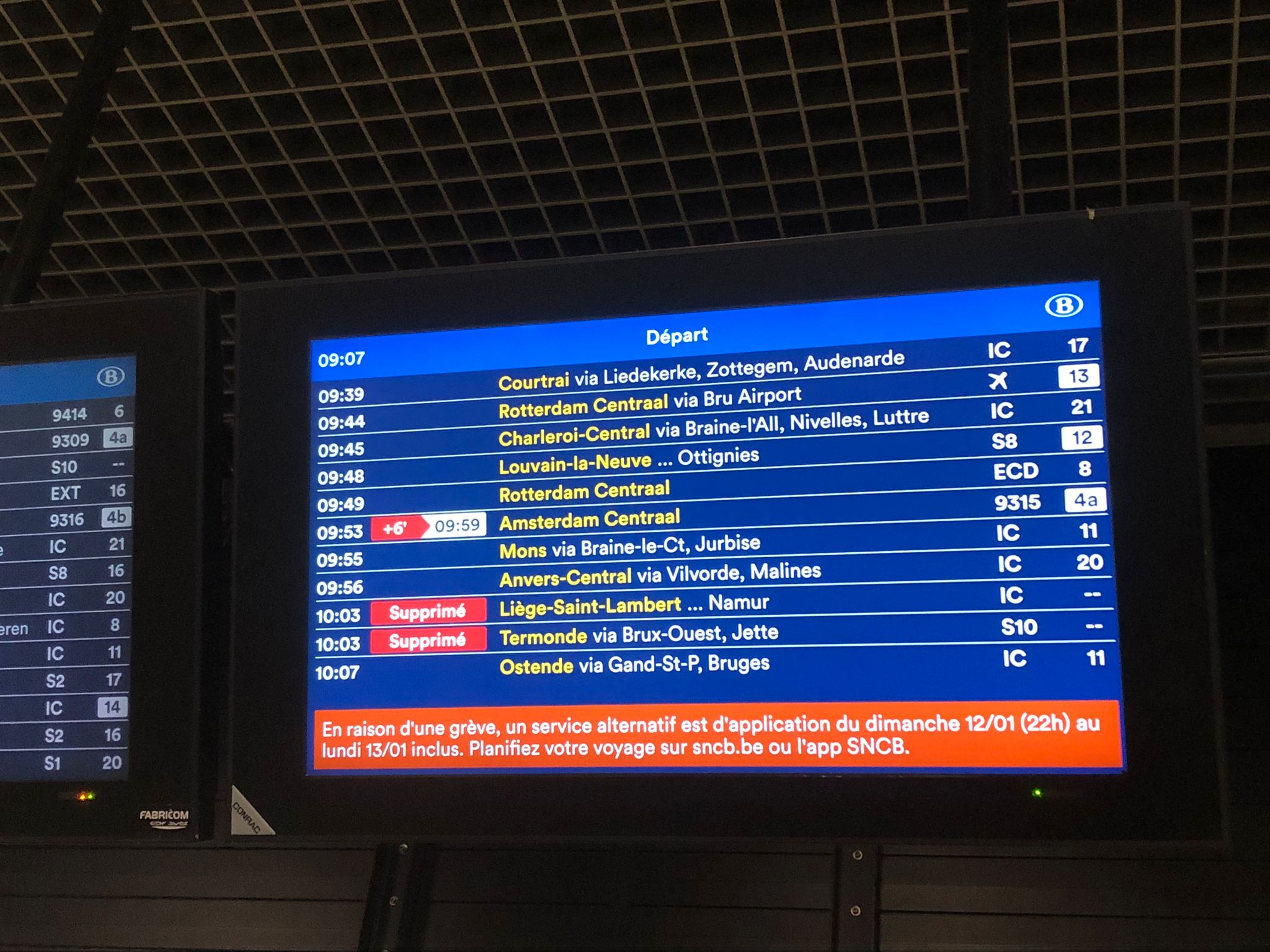
A screen in a Brussels station informing passengers of the strike on 13 January. Credit: The Brussels Times
International travel has also been impacted. Many regional trains to Maastricht, Luxembourg and Lille, among others, have been cancelled, as have several Eurocity trains to and from the Netherlands. The Nightjet to Vienna and Berlin runs from Cologne, Germany instead of Brussels.
The strike will continue until 22:00 tonight. Weather conditions (snow and/or ice) could also impact train traffic.
[08:00 ] - Only one metro running in Brussels
Brussels public transport operator STIB confirmed at 07:00 in the morning that its network is severely disrupted due to the strike. Just one metro is running.
"The following lines are running: metro line 1 (extended to Erasmus), tram lines 4, 7, 8, 9, 10, 51 and 92, and bus lines 12, 34, 36, 45, 46, 50, 53, 54, 58, 59, 65, 71, 73, 87 (extended to Étangs Noirs) and 95," it noted on its website.
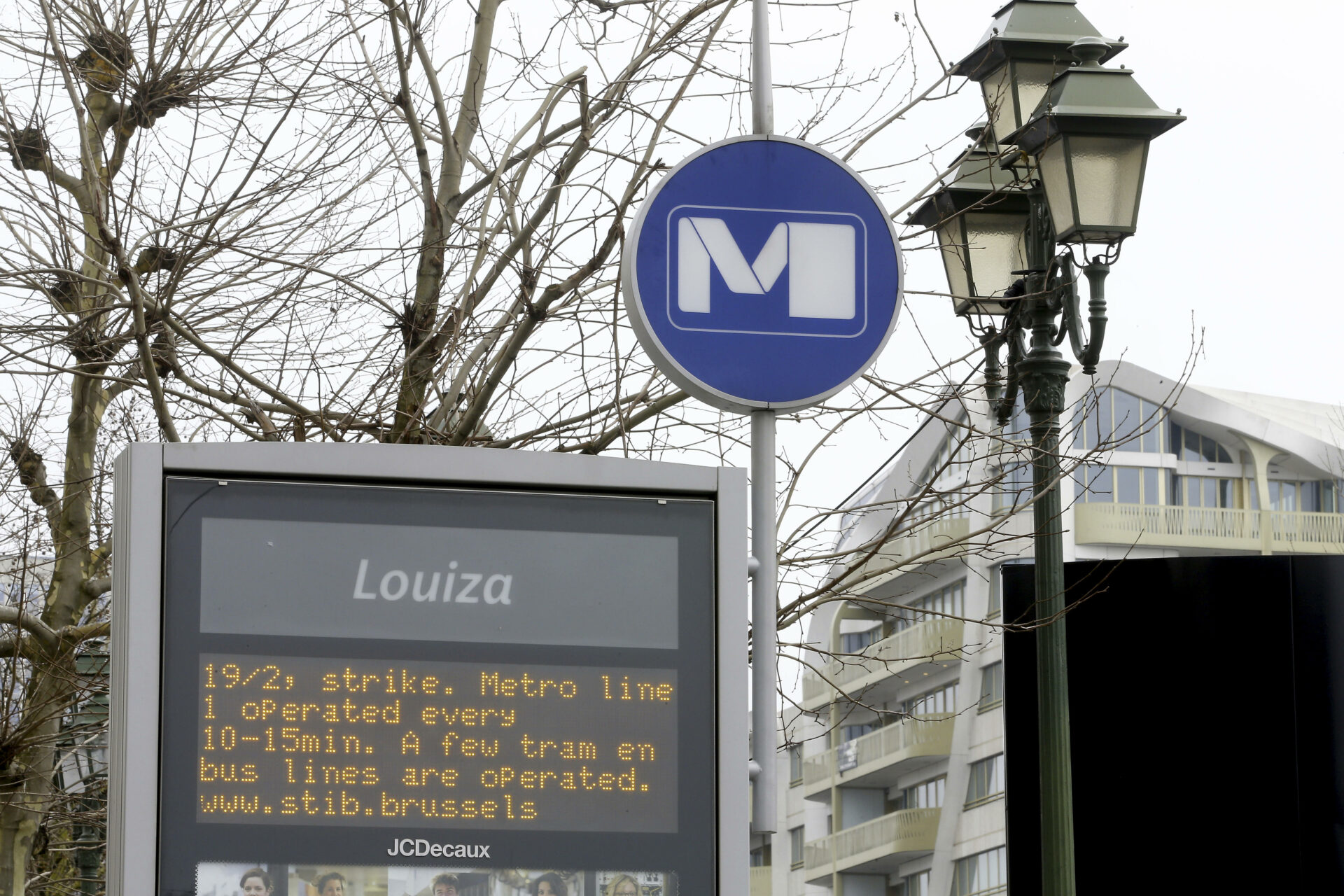
Archive image of a message about the strike at the Louiza metro station. Credit: Belga/ Nicolas Maeterlinck
"All other lines are not served. Frequencies are lower than on a normal day," STIB added.
STIB's multi-mobility app, Floya, will also suggest modified routes based on the lines that do run. It also offers the chance to find an alternative route using bicycles, scooters, taxis and shared cars.
In Flanders, public transport operator De Lijn does not expect any disruption. In Wallonia, TEC expects disruption on its network. Passengers will be informed of cancelled routes via the travel planner on the site.

